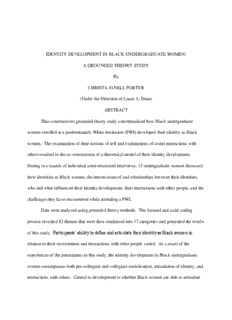
Participants' ability to define and articulate their PDF
Preview Participants' ability to define and articulate their
IDENTITY DEVELOPMENT IN BLACK UNDERGRADUATE WOMEN: A GROUNDED THEORY STUDY By CHRISTA JANELL PORTER (Under the Direction of Laura A. Dean) ABSTRACT This constructivist grounded theory study conceptualized how Black undergraduate women enrolled at a predominately White institution (PWI) developed their identity as Black women. The examination of their notions of self and explanations of social interactions with others resulted in the co-construction of a theoretical model of their identity development. During two rounds of individual semi-structured interviews, 13 undergraduate women discussed their identities as Black women, the intersections of and relationships between their identities, who and what influenced their identity development, their interactions with other people, and the challenges they have encountered while attending a PWI. Data were analyzed using grounded theory methods. The focused and axial coding process revealed 82 themes that were then condensed into 17 categories and generated the results of this study. Participants’ ability to define and articulate their identity as Black women in relation to their environment and interactions with other people varied. As a result of the experiences of the participants in this study, the identity development in Black undergraduate women encompasses both pre-collegiate and collegiate socialization, articulation of identity, and interactions with others. Central to development is whether Black women are able to articulate the intersections of their identities. The influences of media and role modeling throughout various stages of Black women’s lives were also relevant. The implications for practice and future research relating to Black undergraduate women are discussed. INDEX WORDS: Identity Development, Black, Women, Undergraduate, Grounded Theory, Intersectionality, Psychosocial, Cognitive, Student Development IDENTITY DEVELOPMENT IN BLACK UNDERGRADUATE WOMEN: A GROUNDED THEORY STUDY By CHRISTA JANELL PORTER B.S., Michigan State University, 2004 M.A., The University of Maryland, 2006 A Dissertation Submitted to the Graduate Faculty of The University of Georgia in Partial Fulfillment of the Requirements for the Degree DOCTOR OF PHILOSOPHY ATHENS, GEORGIA 2013 © 2013 Christa Janell Porter All Rights Reserved IDENTITY DEVELOPMENT IN BLACK UNDERGRADUATE WOMEN: A GROUNDED THEORY STUDY By CHRISTA JANELL PORTER Major Professor: Laura A. Dean Committee: Corey Johnson Diane L. Cooper Rosemary Phelps Electronic Version Approved: Maureen Grasso Dean of the Graduate School The University of Georgia May 2013 iv DEDICATION I stand on the shoulders of giants – Black women who shed blood, sweat, tears, and even their lives so that I could learn in the educational institutions through which I have matriculated; so that I am able to sit at administrative tables or stand in front of classrooms in order to be a part of change. To the Black women past and present who spoke up when others tried to silence you; to the women who stood up when others tried to force you to sit down; and to the women who kept fighting, even if you were forced into isolation, I dedicate my work to you. v ACKNOWLEDGEMENTS To my Lord and Savior, who has provided me with the ability to acquire this platform, the strength to endure its trials, and the humility to walk out my purpose, I give you all the Glory. This journey has proven to be mentally, emotionally, spiritually, and physically draining, one however that I would not carry out any differently. I endured each challenge and success for a specific reason and with each came a new level of intrapersonal reflection and understanding. I am a better woman, professional, and scholar because of this journey, my cohort, and program faculty. To my family, close friends, and mentors, thank you for your prayers, thoughts, laughter, and continual support on my journey into the woman that God has ordained me to be. To the phenomenal woman who gave me life, Arnita Weaver, thank you for being the model of a Black Christian woman. You have taught me strength, faith, and resiliency; your presence during this journey has been absolutely necessary to my success. To the man who looked into my eyes and saw his soul, your relentless commitment to us has held me up during times when I could barely walk. Frank, despite the distance, you have remained the man I needed you to be and so much more; you are my rock and the air I breathe. I am a better woman because of you. To my advisor, Dr. Laura Dean, we hit it off from the very beginning, and I know that you were placed into my life for a very specific reason. Thank you for your support and care during my process. To my committee members, Drs. Diane Cooper, Corey Johnson, and Rosemary Phelps, you each have played individually special roles during this time for me, and I am forever grateful. To my writing group, Tiffany J. Davis, Joseph N. Cooper, and Shannon R. vi Dean, thank you for making me a better writer and scholar. You always challenged me to look at different perspectives, pushed me beyond my comfort level, and at the end of the day, we always had a good time, particularly at our writing retreat. Finally, I would like to acknowledge the thirteen women who permitted me the opportunity to engage them in dialogue and articulate their experiences through this work. It was in partnership with you, that I was able to co-construct a theoretical model of identity development that will speak to many other Black women around the country. I am grateful for your voices and experiences and it is because you that I continue this work. I hope to be the shoulders upon which you stand in the future. vii LIST OF TABLES Page Table 4.1: Participant Demographic Table……………………………………………....54 Table 4.2: Axial Coding……………………………………………………………...….75 viii LIST OF FIGURES Page Figure 5.1: Model of Identity Development..………………………..….………………82 in Black Undergraduate Women Figure 5.2: Personal Foundations……………………………………………………….84 Figure 5.3: Pre-Socialization…………………………………………………………….86 Figure 5.4: Collegiate Socialization……………………………………………………..89 Figure 5.5: Interactions with Others…………………………………………………….91 Figure 5.6: Articulation of Identity……………………………………………………..93
Description: